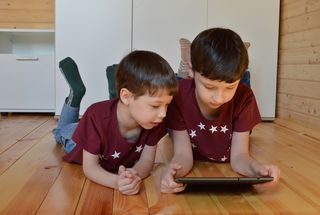ADHD
ADHD and Screen Time During the Quarantine
How and why parents should allow more time online for their kids with ADHD.
Posted April 11, 2020 Reviewed by Gary Drevitch

Sitting in front of a screen all day. During the coronavirus quarantine, it’s a dream come true for some kids with ADHD. While they need to get through a few hours of schoolwork each day, much of the rest of their time can be spent playing video games or watching YouTube. One of the reasons kids with ADHD like screen-based activities is the constant and immediate feedback they get from video games and the high stimulation of video programming. Kids with ADHD also like the feeling of being so focused they often experience with screen-based technologies. This sense of attention and engagement is unlike many of their more mundane school and home activities, during which they often feel bored, get distracted, go from one thing to another, or look for ways to make activities more interesting such as purposely bothering their siblings or demanding the attention of others. Amid the stresses of the quarantine, many parents have found it expedient to let their kids with ADHD spend their time in front of a screen.
I have two suggestions for screen time for kids with ADHD during the quarantine. First, create clear expectations for daily non-screen activities such as regular exercise, chores, hands-on projects, and outdoor time. Second, loosen the reins. A little excess screen time will not hurt now and probably not in the future. But be strategic, so that more screen time improves household sanity, reduces stress, and allows all of you to get your work done. Permitting extended time for screens should have some caveats that can make it healthier and more productive.
Why would you want to loosen the reins on screen time during the quarantine? First of all, safety. We are all being advised to stay home and maintain social distancing. A recent survey conducted by ADDitude magazine found that parents of ADHD teens are very concerned about their kids sneaking out at night so they can hang out with their friends. Many kids with ADHD are impulsive and do not display the best judgment or problem-solving. Keeping kids in the house and engaged, even with screens, is preferable to the risks of infection in the community. Encourage video chat, massively multiplayer online video games with their friends, social media, testing, or even an old-fashioned phone call for children and teens who miss their friends. Remember that they normally spend seven hours a day with their peers in school. Just let it go if your children want to spend an hour or so on TikTok but are getting their schoolwork done and involved with other activities.
Kids’ involvement with screen-based media may also be an excellent diversion from the stress and anxiety many youngsters and adults are experiencing. Video games are cognitively challenging, particularly if you are not playing the same game all day long, and social media keeps kids communicating. Both of these can be effective in stopping individuals from dwelling on the coronavirus. At this time, many psychologists and parenting experts have suggested that children should be allowed to engage in more screen time. A recent New York Times article by Andrew Przybylski and Pete Etchells urged parents to “not freak out about quarantine screen time.” The authors report on recent studies demonstrating that video-game play does not result in cognitive damage to children and that up to two hours a day is correlated with improved psychological adjustment and peer relationships and increased sociality.

My other suggestion, that you maintain clear expectations for non-screen activities, allows for another kid benefit of the quarantine beyond getting to play more video games. Helping kids with ADHD to establish routines for exercise, chores, hobbies, and creativity will assist them when they are no longer quarantined. You’ll have to work hard to make these activities engaging. You might need to purchase some fun board games or new Lego sets, get food to engage kids in a cooking project, or take a drive in order to have a new place to go hiking. And maybe, more importantly, you’ll also have to walk the walk and engage in many activities that are not screen-based yourself.
While the experts might be giving parents permission to loosen the limits during the coronavirus quarantine, there are other concerns. First, I’d strongly encourage that you keep all but mature teens, whether diagnosed with ADHD or not, from live television, where news about the pandemic is frightening for all of us. Also, while extra screen time is more acceptable today and might reduce stress, it should not get in the way of sleep, so be strict about nighttime use.
For kids diagnosed with ADHD, learning disabilities, Autism Spectrum Disorder, and social-emotional struggles, there are other issues to consider. Some of these youngsters become overly engaged in screen-time activities and may begin displaying some addictive-like tendencies. Others become hyper-focused when engaged with screens, so that they almost are unreachable for short periods of time. Kids with social-emotional issues may become over-reliant on screen time as a tool to handle or avoid stressful situations. Kids with ADHD frequently have difficulty transitioning away from technologies and may become highly irritable after gameplay. Learning strategies to address these issues may be more important for parents during this crisis.
The bottom line is that it’s probably OK to let your kids with ADHD spend a bit more time in front of a screen during the quarantine. Be open, yet strategic about allowing more time. Tell the kids what you are doing and why you are letting them spend more time on screens. At the same time, create clear expectations that the additional free time due to the quarantine is for much more than being glued to a screen.


